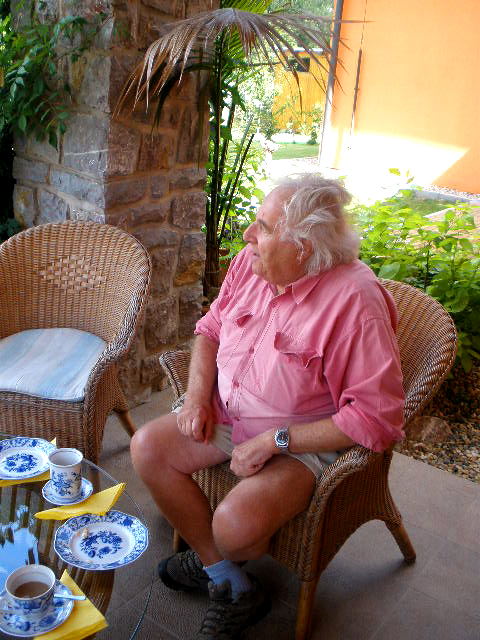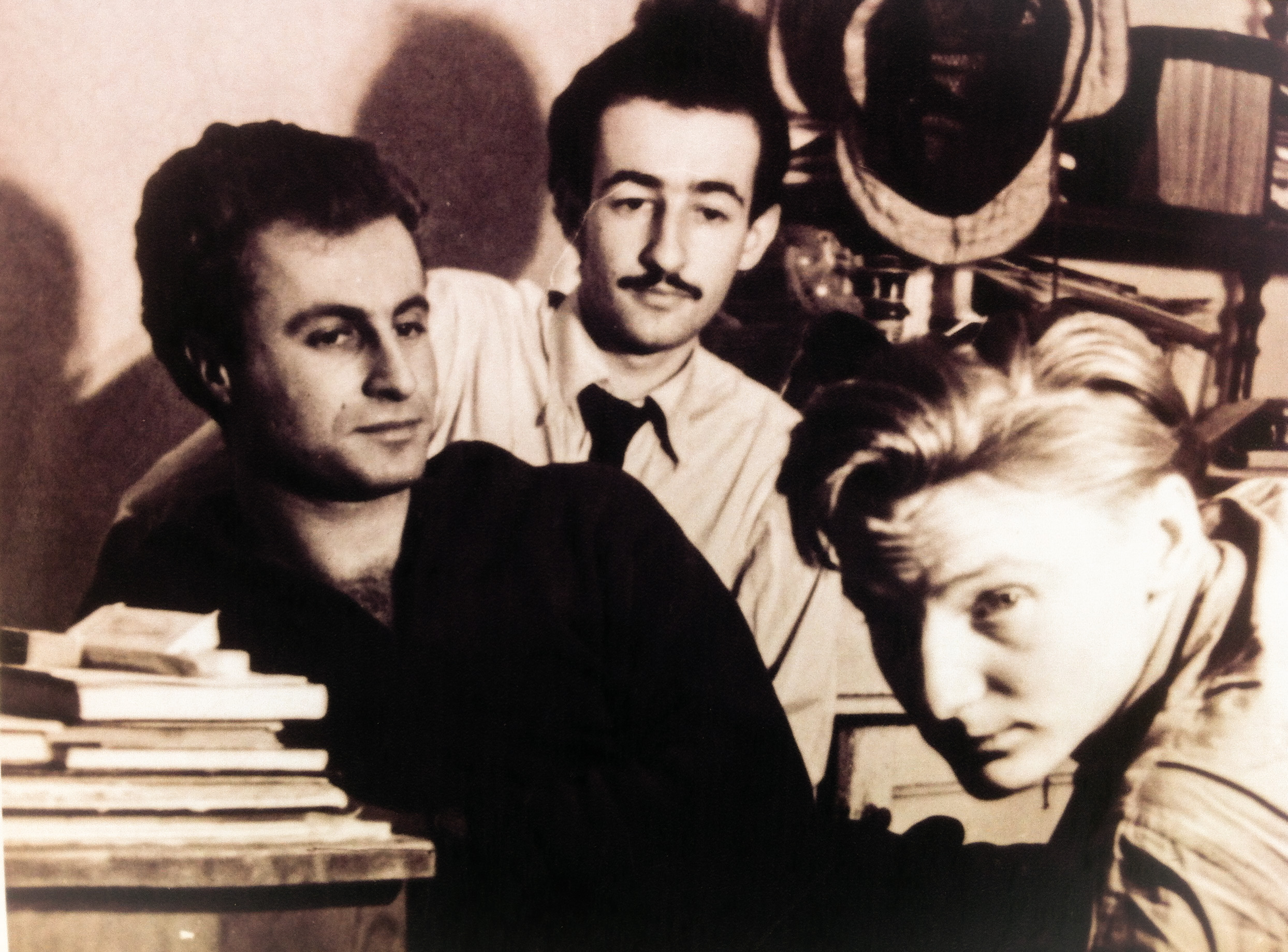
Juraj Sajmovic (cameraman, holder of the prestigious Czech Lion Award for Cinematography for the film Golet v udoli)
Juraj Sajmovic was born on 27 April, 1932 in Piestany in the Slovak Republic into a family with Jewish roots. The outbreak of the Second World War interrupted his previously cerefree childhood and meant spending half a year with his parents hidden in an underground bunker. As he said, he drove away the boredom by tracing stamps and drawing, which he excelled in later at grammar school. Thanks to his talent just before his graduation he moved to the School of Applied Arts in Bratislava, where he was not accepted by the graphics department, but fortunately there was one place free on photography. After his graduation he enrolled at FAMU with the prospect of studying movie directing. As fate would have it, he did not get on the movie directing course, but instead a camera, which became his lifelong passion and his profession.
The artistic activity of Juraj Sajmovic is one of the most significant works of Czech-Slovak cinematography of the second half of the 20th century. He received many prestigious awards for his influences on Czech and Slovak cinematography. During his studies at Prague FAMU he made the film Pasiáns (1969), Archa Blaznu1.Ark of Lunatics (1970), Malostranske povidky2.Tales of the Lesser Quarter, based on the work of the Czech writer Jan Neruda (1984), Muj obchod se psy3.My shop with dogs (1986), and many others. He became famous with audiences especially for the successful series Sanitka4.Ambulance (1984) and exceptional Dobrodruzstvi kriminalistiky5.The adventures of Criminology (1989-1993). For the artistically tuned film Golet v udoli6.The Golet in the Valley (1995), set in the former Ruthenia, he received the renowned Czech Lion Award. In 2011, he participated with his son Juraj Sajmovic Junior on making the family comedy Tady hlidam ja7.I am watching here. Juraj Sajmovic is also a father of two younger children, daughter and son.
Juraj Sajmovic influenced the Czech and Slovak art scene, not only for his outstanding hand-making camera shooting. In 2004, he published the book Duch casu8.The spirit of the time – between photography and movie, which presents his photographs captured between 1950 and 2003. Furthermore, from the second half of the 90s he devoted himself to painting and his works were exhibited in the Gothic style Gallery at the Golden Rooster in the Old Town of Prague. He died on April 20, 2013 in Prague.
For what reason did you decide to emigrate to the Prague? Did you have some awareness of this city?
After graduating from a high school of the industrial arts in Bratislava9.Capital and largest city of Slovakia., me and some fellow students tried to study at FAMU10.Film and TV School of the Academy of Performing Arts in Prague. in Prague, where a good generation of filmmakers were graduating at the time. I wanted to be a film director, but they did not take me there. Happily, there was one place vacant in camera studies.
Did you feel a bit like a stranger in Prague? And how were you affected by the Czech environment?
To be honest, I felt like a Slovak and Czech language had mild problems for me, so I had read a lot of Czech books for a long time before arriving in Prague.
Czech and Slovak languages are very close. I find it incredible that the Czech language could cause you some problems. Could you tell what exactly?
It was not a big problem, because the Czech and Slovak words are mostly similar, but with some exceptions. I remember that when I was young and I came to Prague I was looking for ´ceruska´ and I went to some stationer´s. They replied that they have nothing like that anywhere. Even some man asked me: ´You are a Pole, sir?´ The last store which I visited, I tried pointing with my finger at ´ceruska´ under a glass at the counter. The saleswoman told me that is ´pencil´ (Czech: ´tužka´). Indeed, because of the many words that Czech people did not understand, it made me start to speak Czech. Now I can say that I can speak equally well in both languages. But my memoirs I am writing in Slovak…

Do you think that the Czechs are xenophobic?
I don´t think so. They accepted foreigners in a normal way.
How about when you worked in Czechoslovakia and the Czechs at that time, how do you feel about that time now?
Of course, when I arrived it was in the atmosphere that people cannot fully express their views and their opinions. (He is thinking about the communist era) Today there is much more freedom and more transparency.
Have you ever married in Czechoslovakia?
Yes.
Could you compare and evaluate life in your native country to your present life in the Czech Republic?
I lived in my native country until my twenties and the rest of my life I lived in today´s Czech Republic. The differences between the two countries are minimal because in former Czechoslovakia there was an effort to keep everything uniform, so the ministers were mixed up in the government, and the guys used go to military service from remote parts of Slovakia to the Czech Republic and vice versa.
And what are the advantages and disadvantages of living in the Czech Republic?
Now I will be very open… There is a much greater antisemitism it the Slovak Republic. On the other hand, in terms of my professional background I would be happier in the Slovak Republic.
If you had to evaluate the character traits and differences in social behaviour of Czech and Slovakian people, what would they be?
In my opinion the Czechs have deeper cultural tradition and on the whole they are better educated, maybe I should rather say more pragmatic. To contrast, the Slovaks are undoubtedly honest and unrestrained and spontaneous which was due to the influence of Hungarian culture. Another difference may be that Slovaks, in my opinion, began to realize their national aspirations much later than the Czechs. For this reason their paths diverged.
From a socio-economic point of view, does life seem easier to you in the Czech Republic or in your native country?
I am not a sociologist nor an economist, I cannot compare it.
What do you think that characterizes the Czech Republic, the Czech nation and Czech culture?
This is a very difficult question… I would answer in one sentence: Belonging to the Central European culture.
What is the most similar country to the Czech Republic?
The Czech Republic isn´t like other countries, but currently is most similar to Slovakia. I think that in the long term both countries have developed in many areas in the same way, for example certain political events and also in the artistic sphere. The two countries have lived together for seventy years and for this reason they walk in the same direction, both to the beat of inertia.
If you had to choose only one nationality, which would it be?
Slovakian.
But what nationality do you have now?
Czech.
But I suppose that you chose the Czech nationality…
Yeah, I chose the Czech.
Hm, that sounds a bit contradictory…
Yes, it is. The counterpoint for the bright minds… I am Czechoslovakian with Jewish roots. However I feel Slavic in the same way. This means that I don´t feel the generally prevailing detachment from everything from East. For example I really appreciate the Russian people, I consider them to be a talented nation and I support them like I support everything what is good.
And according to what and how do you think a foreigner can become a Czech?
In my opinion, it depends on three factors. First of all it is a question of how long the foreigner or immigrant has lived in the Czech Republic. Secondly, the extent to which, he is bound to his native country. And the last thing, what are his possibilities of succeeding in a professional way.
What country has the best behaviour to the foreigners?
According to my own experience I suppose the United States, because they are compounded of immigrants.
If you look back to the past, do you regret that you started a family and you lived a long life in the Czech Republic?
I cannot regret when I look back. The first stimulus for life in the Czech Republic was family. I had a wife and child. My profession played another important role. I wanted to work in Slovakia and I even applied for a job, but they did not answer me and these were the two fundamental reasons why I stayed here. Well, then I started to make films and my new ´homeland´ remained Czech.
Editorial Note: The interview between Juraj Sajmovic and Barbora Sajmovicova took place in Autumn in 2011 in Prague. The interview was also conducted as part of one of the final works of Barbora Sajmovicova for Institute of Ethnology at Charles University in Prague.
| ↑1 | Ark of Lunatics |
|---|---|
| ↑2 | Tales of the Lesser Quarter, based on the work of the Czech writer Jan Neruda |
| ↑3 | My shop with dogs |
| ↑4 | Ambulance |
| ↑5 | The adventures of Criminology |
| ↑6 | The Golet in the Valley |
| ↑7 | I am watching here |
| ↑8 | The spirit of the time – between photography and movie |
| ↑9 | Capital and largest city of Slovakia. |
| ↑10 | Film and TV School of the Academy of Performing Arts in Prague. |